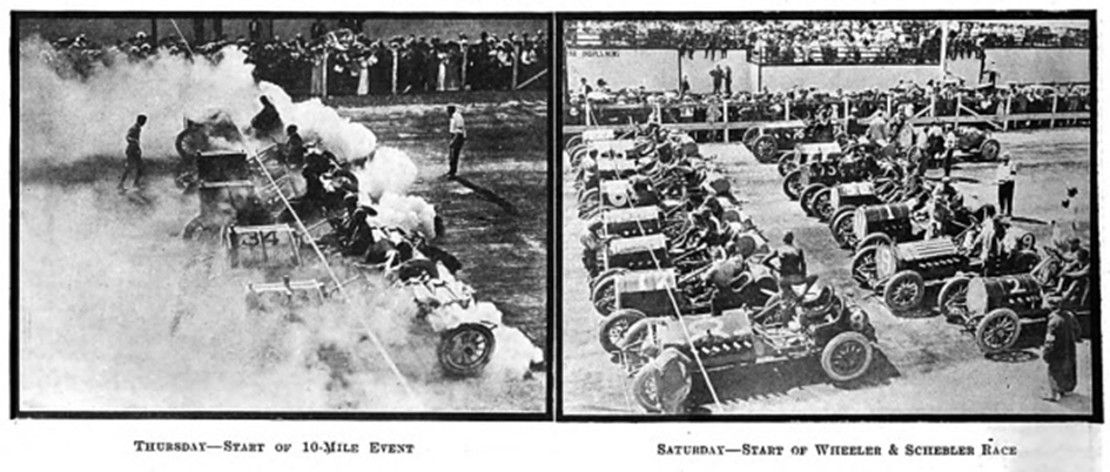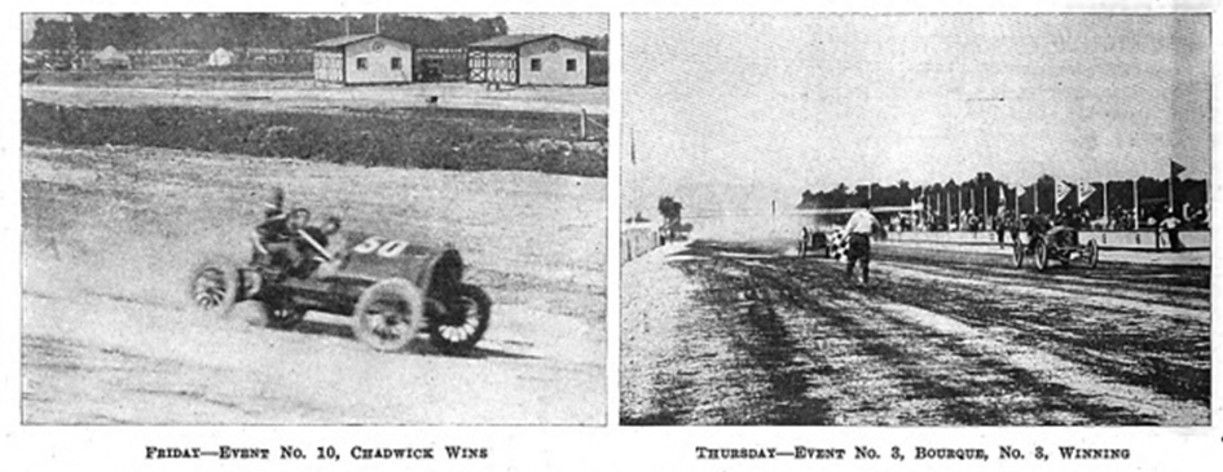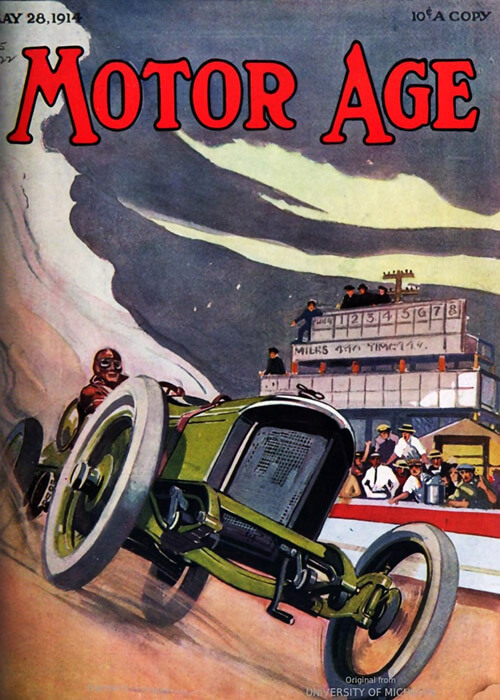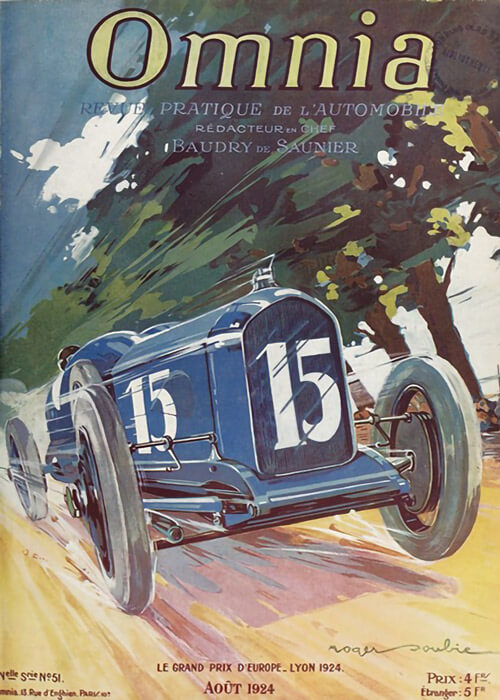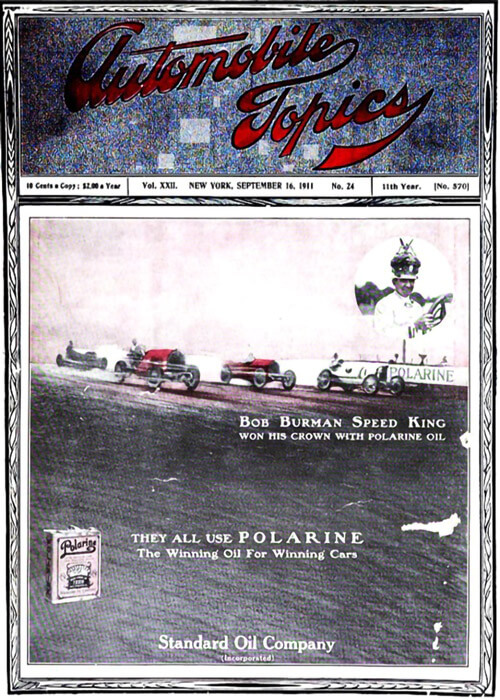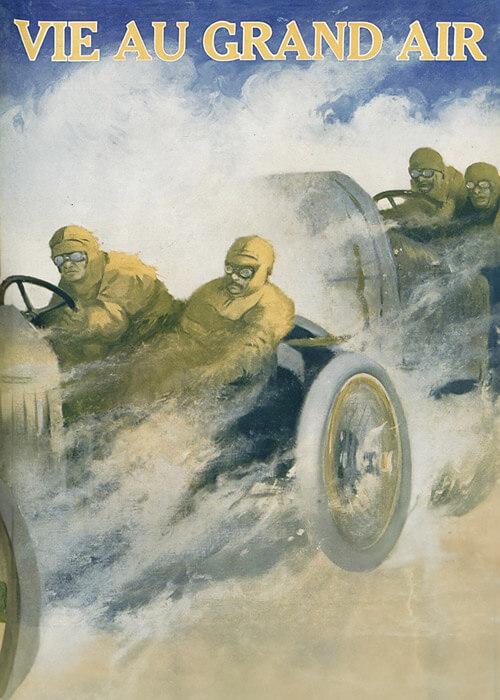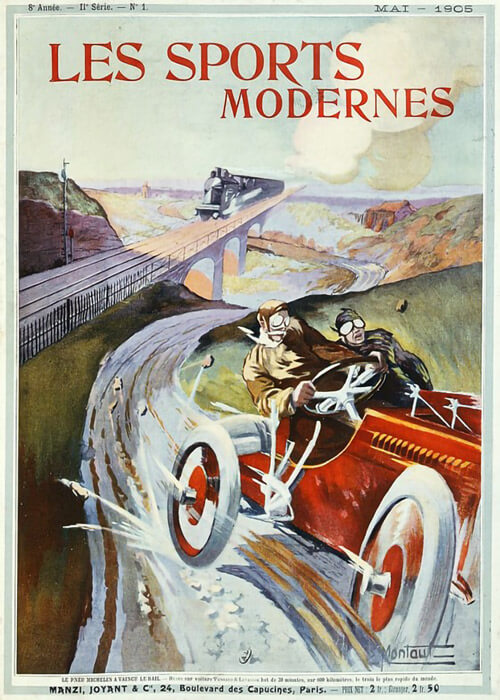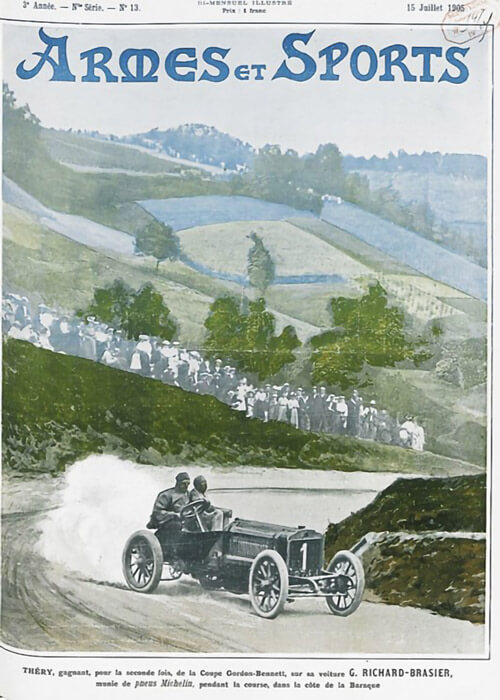The 300-miles long Saturday race for the Wheeler & Schebler Trophy, finally was halted by the referee. Reasons were: 1) the National car of Merz ran off the bank, thereby killing his mechanic Kellum and two spectators. 2) Shortly after that, Keen in a Marmon hit a pole, wherby his mechanic suffered a fractured skull. Enough was enough! The whole race was called off on the spot.
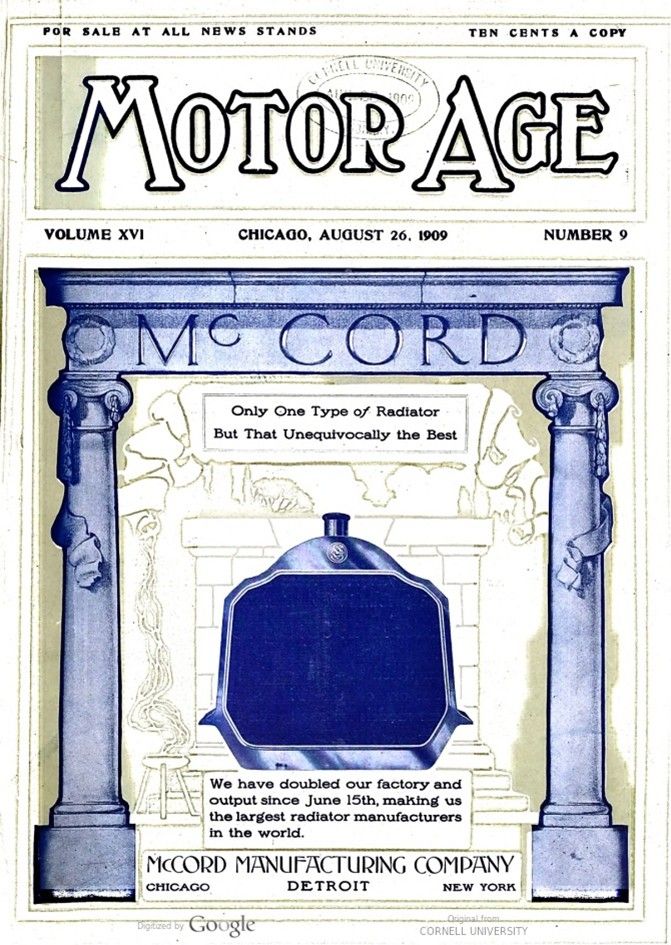
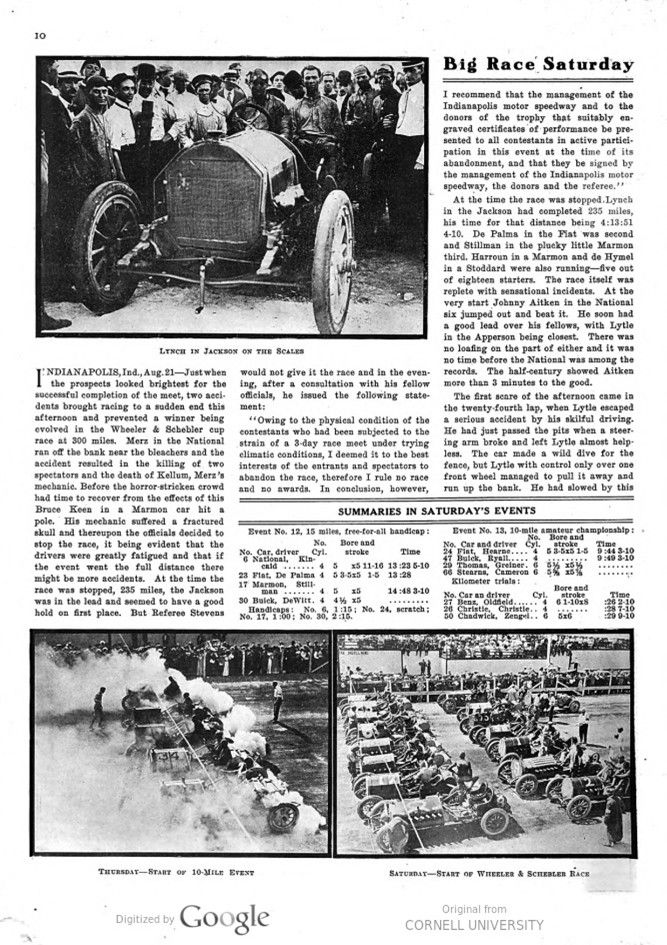
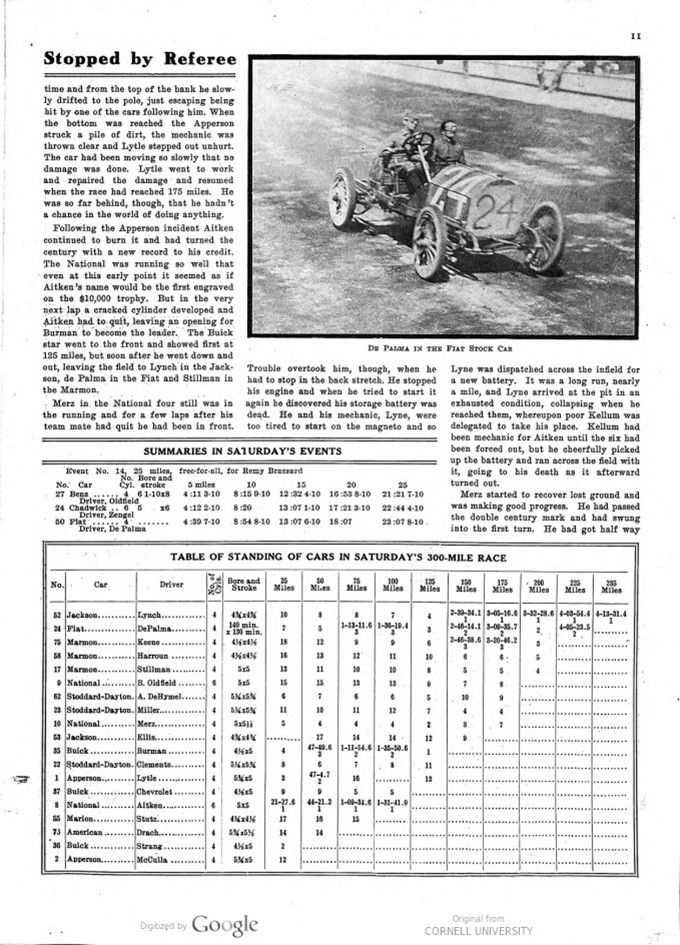
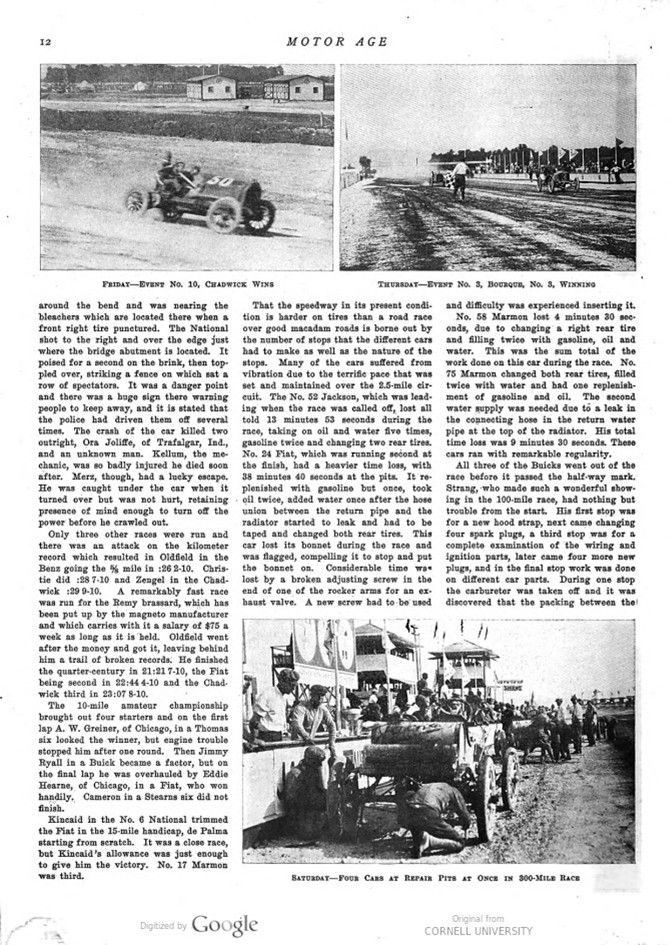
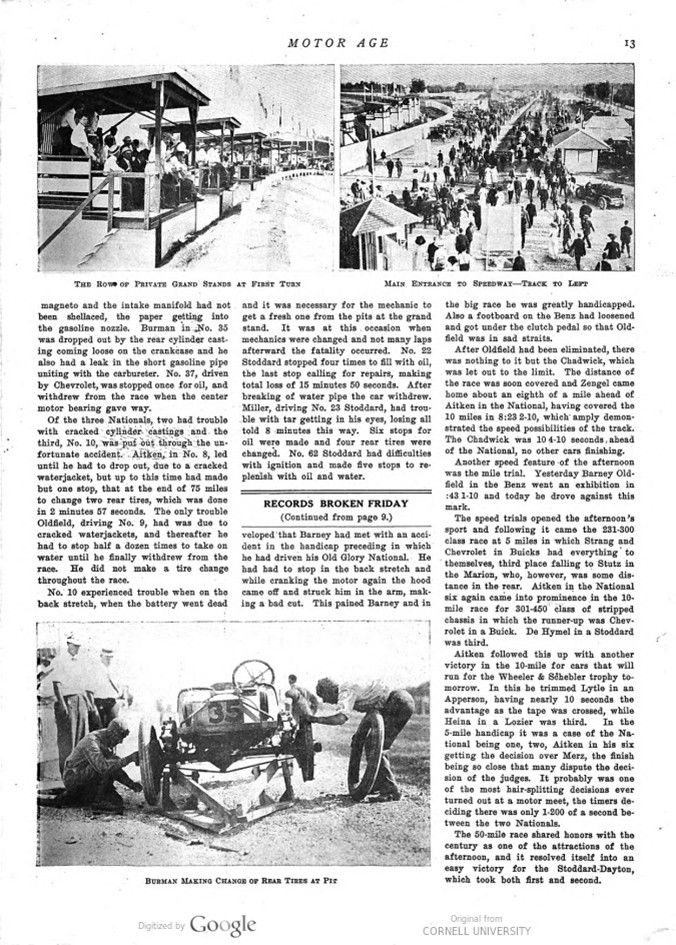
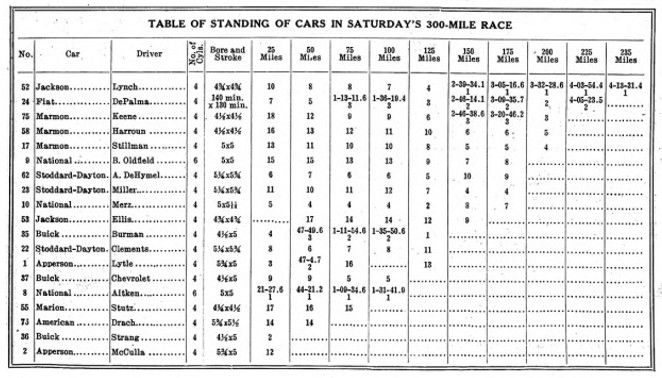
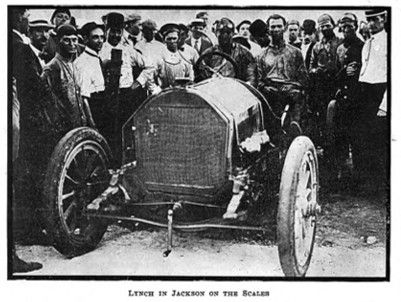
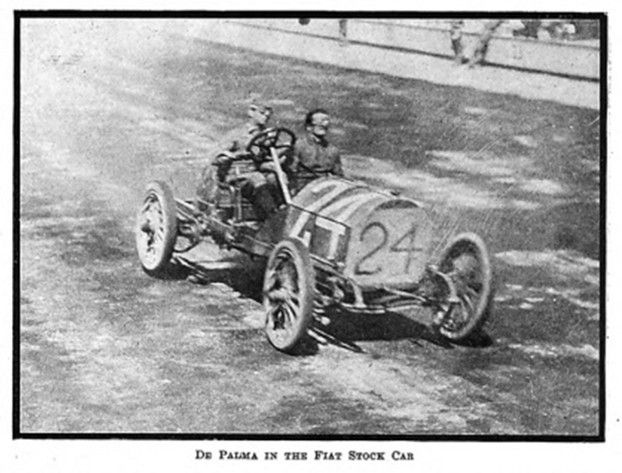
Text and jpegs by courtesy of hathitrust.org www.hathitrust.org, compiled by motorracinghistory.com
Motor Age Volume XVI, No. 9, August 26, 1909.
Big Race Saturday Stopped by Referee
INDIANAPOLIS, Ind., Aug.21 – Just when the prospects looked brightest for the successful completion of the meet, two accidents brought racing to a sudden end this afternoon and prevented a winner being evolved in the Wheeler & Schebler cup race at 300 miles. Merz in the National ran off the bank near the bleachers and the accident resulted in the killing of two spectators and the death of Kellum, Merz’s mechanic. Before the horror-stricken crowd had time to recover from the effects of this, Bruce Keen in a Marmon car hit a pole. His mechanic suffered a fractured skull and thereupon the officials decided to stop the race, it being evident that the drivers were greatly fatigued and that if the event went the full distance there might be more accidents. At the time the race was stopped, 235 miles, the Jackson was in the lead and seemed to have a good hold on first place. But Referee Stevens would not give it the race and in the evening, after a consultation with his fellow officials, he issued the following statement:
“Owing to the physical condition of the contestants who had been subjected to the strain of a 3-day race meet under trying climatic conditions, I deemed it to the best interests of the entrants and spectators to abandon the race, therefore I rule no race and no awards. In conclusion, however, I recommend that the management of the Indianapolis motor speedway and to the donors of the trophy that suitably engraved certificates of performance be presented to all contestants in active participation in this event at the time of its abandonment, and that they be signed by the management of the Indianapolis motor speedway, the donors and the referee.”
At the time the race was stopped Lynch in the Jackson had completed 235 miles, his time for that distance being 4:13:51 4-10. De Palma in the Fiat was second and Stillman in the plucky little Marmon third. Harroun in a Marmon and de Hymel in a Stoddard were also running — five out of eighteen starters. The race itself was replete with sensational incidents. At the very start Johnny Aitken in the National six jumped out and beat it. He soon had a good lead over his fellows, with Lytle in the Apperson being closest. There was no loafing on the part of either and it was no time before the National was among the records. The half-century showed Aitken more than 3 minutes to the good.
The first scare of the afternoon came in the twenty-fourth lap, when Lytle escaped a serious accident by his skilful driving. He had just passed the pits when a steering arm broke and left Lytle almost helpless. The car made a wild dive for the fence, but Lytle with control only over one front wheel managed to pull it away and run up the bank. He had slowed by this time and from the top of the bank he slowly drifted to the pole, just escaping being hit by one of the cars following him. When was reached the Apperson struck a pile of dirt, the mechanic was thrown clear and Lytle stepped out unhurt. The car had been moving so slowly that no Lytle went to work the bottom damage was done. and repaired the damage and resumed when the race had reached 175 miles. was so far behind, though, that he hadn’t a chance in the world of doing anything.
Following the Apperson incident Aitken continued to burn it and had turned the century with a new record to his credit. The National was running so well that even at this early point it seemed as if Aitken’s name would be the first engraved on the $10,000 trophy. But in the very next lap a cracked cylinder developed and Aitken had to quit, leaving an opening for Burman to become the leader. The Buick star went to the front and showed first at 125 miles, but soon after he went down and out, leaving the field to Lynch in the Jackson, de Palma in the Fiat and Stillman in the Marmon.
Merz in the National four still was in the running and for a few laps after his team mate had quit he had been in front. Trouble overtook him, though, when he had to stop in the back stretch. He stopped his engine and when he tried to start it again he discovered his storage battery was dead. He and his mechanic, Lyne, were too tired to start on the magneto and so Lyne was dispatched across the a new battery. infield for It was a long run, nearly a mile, and Lyne arrived at the pit in an exhausted condition, collapsing when he reached them, whereupon poor Kellum was delegated to take his place. Kellum had been mechanic for Aitken until the six had been forced out, but he cheerfully picked up the battery and ran across the field with it, going to his death at it afterward turned out.
Merz started to recover lost ground and was making good progress. He had passed the double century mark and had swung into the first turn. He had got half way around the bend and was nearing the bleachers which are located there when a front right tire punctured. The National shot to the right and over the edge just where the bridge abutment is located. It poised for a second on the brink, then toppled over, striking a fence on which sat a row of spectators. It was a danger point and there was a huge sign there warning people to keep away, and it is stated that the police had driven them off several times. The crash of the car killed two outright, Ora Joliffe, of Trafalgar, Ind., and an unknown man. Kellum, the mechanic, was so badly injured he died soon after. Merz, though, had a lucky escape. He was caught under the car when it turned over but was not hurt, retaining presence of mind enough to turn off the power before he crawled out.
Only three other races were run and there was an attack on the kilometer record which resulted in Oldfield in the Benz going the 33 mile in :262-10. Christie did :28 7-10 and Zengel in the Chadwick :299-10. A remarkably fast race was run for the Remy brassard, which has been put up by the magneto manufacturer and which carries with it a salary of $75 a week as long as it is held. Oldfield went after the money and got it, leaving behind him a trail of broken records. He finished the quarter-century in 21:217-10, the Fiat being second in 22:44 4-10 and the Chadwick third in 23:07 8-10.
The 10-mile amateur championship brought out four starters and on the first lap A. W. Greiner, of Chicago, in a Thomas six looked the winner, but engine trouble stopped him after one round. Then Jimmy Ryall in a Buick became a factor, but on the final lap he was overhauled by Eddie Hearne, of Chicago, in a Fiat, who won handily. Cameron in a Stearns six did not finish.
Kincaid in the No. 6 National trimmed the Fiat in the 15-mile handicap, de Palma starting from scratch. It was a close race, but Kincaid’s allowance was just enough to give him the victory. No. 17 Marmon was third.
That the speedway in its present condition is harder on tires than a road race over good macadam roads is borne out by the number of stops that the different cars had to make as well as the nature of the stops. Many of the cars suffered from vibration due to the terrific pace that was set and maintained over the 2.5-mile circuit. The No. 52 Jackson, which was leading when the race was called off, lost all told 13 minutes 53 seconds during the race, taking on oil and water five times, gasoline twice and changing two rear tires. No. 24 Fiat, which was running second at the finish, had a heavier time loss, with 38 minutes 40 seconds at the pits. It replenished with gasoline but once, took oil twice, added water once after the hose union between the return pipe and the radiator started to leak and had to be taped and changed both rear tires. This car lost its bonnet during the race and was flagged, compelling it to stop and put the bonnet on. Considerable time was lost by a broken adjusting screw in the end of one of the rocker arms for an exhaust valve. A new screw had to be used and difficulty was experienced inserting it. No. 58 Marmon lost 4 minutes 30 seconds, due to changing a right rear tire and filling twice with gasoline, oil and water. This was the sum total of the work done on this car during the race. No. 75 Marmon changed both rear tires, filled twice with water and had one replenishment of gasoline and oil. The second water supply was needed due to a leak in the connecting hose in the return water pipe at the top of the radiator. His total time loss was 9 minutes 30 seconds. These cars ran with remarkable regularity.
All three of the Buicks went out of the race before it passed the half-way mark. Strang, who made such a wonderful showing in the 100-mile race, had nothing but trouble from the start. His first stop was for a new hood strap, next came changing four spark plugs, a third stop was for a complete examination of the wiring and ignition parts, later came four more new plugs, and in the final stop work was done on different car parts. During one stop the carbureter was taken off and it was discovered that the packing between the stands magneto and the intake manifold had not been shellaced, the paper getting into the gasoline nozzle. Burman in No. 35 was dropped out by the rear cylinder casting coming loose on the crankcase and he also had a leak in the short gasoline pipe uniting with the carbureter. No. 37, driven by Chevrolet, was stopped once for oil, and withdrew from the race when the center motor bearing gave way.
Of the three Nationals, two had trouble with cracked cylinder castings and the third, No. 10, was put out through the unfortunate accident. Aitken, in No. 8, led until he had to drop out, due to a cracked waterjacket, but up to this time had made but one stop, that at the end of 75 miles to change two rear tires, which was done in 2 minutes 57 seconds. The only trouble Oldfield, driving No. 9, had was due to cracked waterjackets, and thereafter he had to stop half a dozen times to take on water until he finally withdrew from the race. He did not make a tire change throughout the race.
No. 10 experienced trouble when on the back stretch, when the battery went dead and it was necessary for the mechanic to get a fresh one from the pits at the grand stand. It was at this occasion when mechanics were changed and not many laps afterward the fatality occurred. No. 22 Stoddard stopped four times to fill with oil, the last stop calling for repairs, making total loss of 15 minutes 50 seconds. After breaking of water pipe the car withdrew. Miller, driving No. 23 Stoddard, had trouble with tar getting in his eyes, losing all told 8 minutes this way. Six stops for oil were made and four rear tires were changed. No. 62 Stoddard had difficulties with ignition and made five stops to replenish with oil and water.
